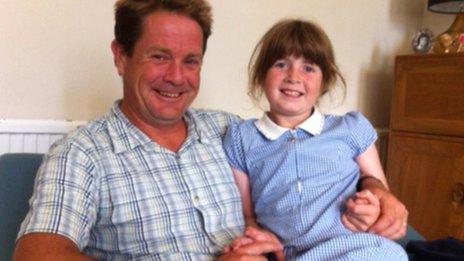Anger as diabetic children miss out on insulin pumps
- Published

Neil Agutter and his nine-year-old daughter Emily, who both have diabetes
Some health boards in Wales are not following mandatory guidelines by failing to provide insulin pumps to children with type 1 diabetes, BBC Wales has found.
Pumps change the lives of diabetics by removing the need for daily injections and must be provided if needed.
But BBC Wales has found there are 29 young patients in Wales waiting for insulin pump therapy.
The Welsh government said it expected health boards to follow the guidelines.
BBC Radio Wales current affairs programme Eye On Wales spoke to the Children's Commissioner for Wales who said it could be a breach of the children's human rights.
There are two kinds of diabetes. Type 2 accounts for 90% of cases - and 10% of NHS spending - and is linked to lifestyle, obesity and age.
Type 1 diabetes has no link to lifestyle choices and occurs when the pancreas fails to produce the insulin the body needs to process glucose.
It is managed by measuring the sugar in the bloodstream and then giving the body the insulin it needs to survive.
There are approximately 16,000 people with type 1 diabetes in Wales and 1,400 of them are children and young people.
Nine-year-old Emily Agutter, from Usk in Monmouthshire, has to test her blood sugar levels and inject herself with insulin several times a day after being diagnosed with type 1 diabetes over a year ago.
She does not like the injections and would like to try an insulin pump but her health board has told her family she cannot have one yet.
Emily has been waiting for 10 months despite the National Institute for Health and Care Excellence (NICE) guidelines which say one should be provided. Her father, Neil Agutter, who also has type 1 diabetes, has an insulin pump.
"It makes me incredibly angry - it's there in black and white," Mr Agutter said.
Waiting list
"We have asked and there are funding issues in terms of resources for the hospital.
"The hospital doctors and nurses who treat Emily are lovely and they do a great job. We've just been told they can't do it yet, there's too many people waiting. And when somebody's nine years old, it's a long time for somebody so young."
Emily is not the only child with type 1 diabetes waiting for an insulin pump in Wales.
Eye on Wales has learned that three health boards have children on a waiting list - Emily's own board, Aneurin Bevan, has 15 youngsters waiting while Cardiff and Vale has 11 and Hywel Dda, three.
"If you're on a waiting list then I think you could take a pretty clear view that that's a breach of that child's rights," said the Children's Commissioner for Wales Keith Towler.
"Now if the child wants the pump and the family are happy for the child to have the pump, then actually sort out the resource issues later if you have to, but actually just make that pump available.
"This is a life-changing diagnosis for a child and that child needs as much support as they can possibly get. Let's take it right back to the child and make sure that the child gets that service."
The pumps remove the need for daily injections and must be provided if both patient and doctor agree
Aneurin Bevan Health Board said while it could not comment on individual cases it was committed to increasing access to insulin pump therapy as a treatment option.
The board said it planned to increase the number of children on the therapy from 33 to 90 over the next two years.
'Stretched budgets'
Health Minister Mark Drakeford said: "I'm afraid just in the practical world, it won't always be the case that the minute someone has been assessed for an insulin pump that that pump will immediately be available..."
He said staff were also required to make sure the pump was "successfully used".
"So I would expect anybody who has been assessed that every effort is made at local health board level to make the period of time they have to wait between being assessed for suitability and getting the pump to be short as possible," he said.
"I certainly expect the health boards will follow mandatory NICE guidance, that they have to find ways within their very stretched budgets to be able to do that."
He said the Welsh NHS spent £500m a year on diabetes, and health boards had to prioritise and put the money where it was most needed.
Eye on Wales is on BBC Radio Wales on Sunday, 20 October at 12:00 BST.
- Published20 October 2013
- Published26 September 2013
- Published24 June 2013
- Published2 April 2013
- Published20 January 2013
- Published20 November 2012